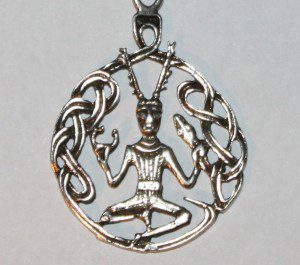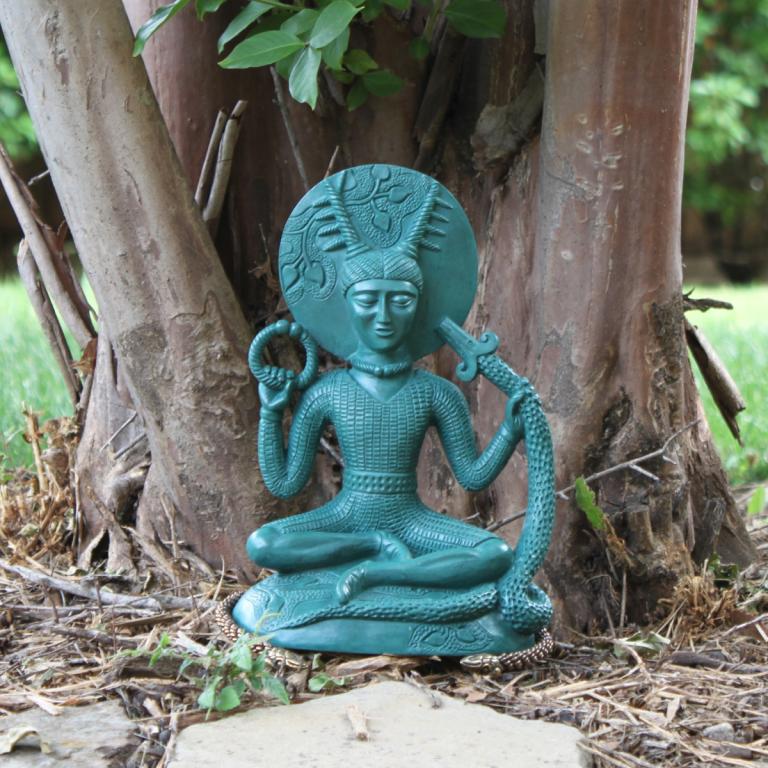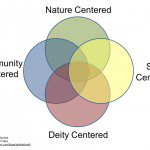I was a devotee and a priest of Cernunnos long before I started this blog. Over the years I’ve told parts of my story with Him (here, here, and here, for a good start), probably enough for a diligent reader to piece the whole thing together, if one was so inclined. I’ve reviewed a very good book of devotions to Him written by others. What I haven’t done is talk about who and what He is, as He’s presented himself to me.
Let’s start with what we know about the history of Cernunnos, which can be summarized in two words: not much. The name appears only once, on the Pillar of the Boatmen, which dates to the first century CE. The image of Him on the pendant and statue I have comes from the Gundestrup Cauldron (from about the same time period, although it can’t be dated as precisely) which does not mention Him by name.
For a look at how Cernunnos came to be identified with a possibly-universal Horned God in modern times, read this piece by Jason Mankey. Be sure to read the comments by P. Sufenas Virius Lupus, but don’t get bogged down with what turned out to be a debate generating more heat than light.
If there was lore to study and wisdom to extract from documentation I would dive into it. There isn’t. Besides, it is fitting that a God of Nature must be met in Nature and not in books. That’s what I’ve done – what follows is my experience of Cernunnos. I would call it UPG (unverified personal gnosis) but so much of what I’ve experienced has also been experienced by others that I tend to think of it as SPG (shared personal gnosis).
I first met Him in the woods when I was a small child. I didn’t know anything about Gods or Goddesses or Nature spirits or anything of the sort. I was taught there was only one God and I hadn’t yet learned enough to question that teaching. I just knew the woods were a magical place. Part of that is the beauty of wild places and the spirits that inhabit them. But there was more. There was Someone in the woods who listened.
I rant a lot about people who see the Gods as their guardian angels or as personal life coaches whose primary concern is their happiness. I see a lot of immature theology in Paganism, much of it carried over from the dominant Christian culture – where serious Christians also rant about immature theology. But while I think it is immature and disrespectful to assume we are the primary concern of the Gods, it is just as clear – from my own experience and from the experience of other devotional polytheists – that They do take an interest in some humans, in some ways, at some times.
Did the Forest God see a young boy retreating into a wooded refuge and take pity on him? Was He moved to love a human who shared His love of the wild? Did He see the potential for a future priest? I don’t know. I just know that when I went into the woods I was comforted, and I was encouraged to keep moving and keep working and that things would get better some day. And they did.
 When I got older I stopped seeing Him, but I never lost my love of the forest. When I was ready to see Him as the God He is, He called me. For about two years after that, I did the usual things: prayer, devotion, and especially meditation – not Buddhist-style mind-emptying, but sitting quietly and listening for Him.
When I got older I stopped seeing Him, but I never lost my love of the forest. When I was ready to see Him as the God He is, He called me. For about two years after that, I did the usual things: prayer, devotion, and especially meditation – not Buddhist-style mind-emptying, but sitting quietly and listening for Him.
And then one evening a small group of us who had been studying altered states of consciousness decided to attempt a divine invocation. I wasn’t sure what to expect, but I felt like this was something I needed to do. The setting was beautiful and I was comfortable with everyone who was there, so I volunteered.
I can’t recall the exact ritual we used – it was some variation on the Wiccan Drawing Down rite. My notes (written the next day) are rather vague – there was a lot of experiencing and not a lot of thinking going on. Actually, that was the biggest challenge for me: turning off my skeptical side long enough for Him to come through. But I did, and He did.
Note to polytheists: sometimes doing the right thing the wrong way works anyway. The Gods are good like that… although missteps They ignored then probably wouldn’t be viewed so favorably now.
Whenever I read the word “ineffable” this experience comes to mind. I can’t explain it not because it’s too sacred or too intimate but because there are no words that can adequately communicate the experience of a God sharing your body. This wasn’t full divine possession as happens in Vodun ceremonies. I was still there… which made it all the more amazing. I got a taste, a glimpse, a hint, of what it’s like to be a God. And I got to remember it.
When non-theists suggest that such experiences are best explained as variations in brain chemistry, I understand – from an intellectual standpoint. But I was there, I experienced what I experienced, I felt what I felt, and I couldn’t rationalize it away if I wanted to… and I’m very good at rationalization. This was as real as anything I’ve ever done.
I’ve had one other experience like that. I could get addicted to it, but I suspect if I treated it as anything other than a holy communion He would simply decline to participate. The purpose of these ecstatic experiences wasn’t to make me feel good. It was to give me the confidence I needed to do the work I’m called to do.
What work is that?
At my religious and spiritual core, I’m a Druid. And part of being a Druid – especially in my order – is being a Bard: a storyteller. That’s what He wants me to do – tell His stories.
He wants me to tell the story of the Forest God who nurtures the places that nurture our bodies and our souls.
He wants me to tell the story of the Lord of Animals who knows some creatures must die so that others may live, but who weeps over needless deaths.
He wants me to tell the story of the Wild God who reminds us it’s not enough to love Nature – we must remember we are Nature, and that to cut ourselves off from the Wild is to cut ourselves off from Life.
I know what these stories mean to me and what they – and He – tell me to do.
What do they mean to you?
That’s between you and Him. You have heard them. How you respond is up to you.



















